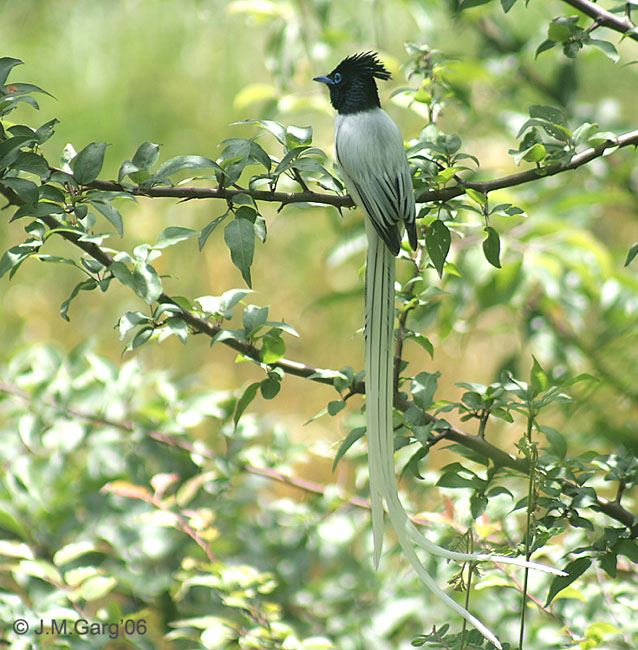|
| Query: drongo | Result: 132nd of 142 | |
Asian Paradise-flycatcher (Terpsiphone paradisi) - Wiki
| Subject: | Asian Paradise-flycatcher (Terpsiphone paradisi) - Wiki
| |

| Resolution: 638x650
File Size: 152572 Bytes
Date: 2006:05:18 09:57:58
Camera: Canon EOS 350D DIGITAL (Canon)
F number: f/5.6
Exposure: 1/320 sec
Focal Length: 300/1
Upload Date: 2007:11:01 13:24:04
|
Asian Paradise-flycatcher
From Wikipedia, the free encyclopedia
[Photo] Asian Paradise-flycatcher (Terpsiphone paradisi) adult male in Kullu-Manali Distt. of Himachal Pradesh, India. Date 18/5/06. Author J.M.Garg (http://commons.wikimedia.org/wiki/User:J.M.Garg) Copyright (C) 2006 J. M. Garg
Permission is granted to copy, distribute and/or modify this document under the terms of the GNU Free Documentation License, Version 1.2 or any later version published by the Free Software Foundation; with no Invariant Sections, no Front-Cover Texts, and no Back-Cover Texts. A copy of the license is included in the section entitled "GNU Free Documentation License". |
The Asian Paradise-flycatcher (Terpsiphone paradisi), also known as the Common Paradise-flycatcher, is a medium-sized passerine bird. It was previously classified with the Old World flycatcher family Muscicapidae, but the paradise-flycatchers, monarch flycatchers and Australasian fantails are now normally grouped with the drongos in the family Dicruridae, which has most of its members in Australasia and tropical southern Asia.
The Asian Paradise-flycatcher breeds from Turkestan to Manchuria. It is migratory, wintering in tropical Asia. There are resident populations further south, for example in southern India and Sri Lanka, so both visiting migrants and the locally breeding subspecies occur in these areas in winter.
This species is usually found in thick forests and other well-wooded habitats. Three or four eggs are laid in a cup nest in a tree.
The adult male Asian Paradise-flycatcher is about 20 cm long, but the long tail streamers double this. It has a black crested head, chestnut upperparts and pale grey underparts.
By their second year, the males of the migratory Indian race T. p. paradisi (Indian Paradise-Flycatcher) begin to acquire white feathers. By the third year, the male plumage is completely white, other than the black head. Males of the sedentary Sri Lankan race T. p. ceylonensis (Sri Lankan Paradise-Flycatcher) are always chestnut.
The female of all races resembles the chestnut male, but has a grey throat, smaller crest and lacks the tail streamers.
The Asian Paradise-flycatcher is a noisy bird with a sharp zweet call. It has short legs and sits very upright whilst perched prominently, like a shrike. It is insectivorous, often hunting by flycatching.
http://en.wikipedia.org/wiki/Asian_Paradise-flycatcher
| The text in this page is based on the copyrighted Wikipedia article shown in above URL. It is used under the GNU Free Documentation License. You may redistribute it, verbatim or modified, providing that you comply with the terms of the GFDL. |
|
^o^
Animal Pictures Archive for smart phones
^o^
|
|

